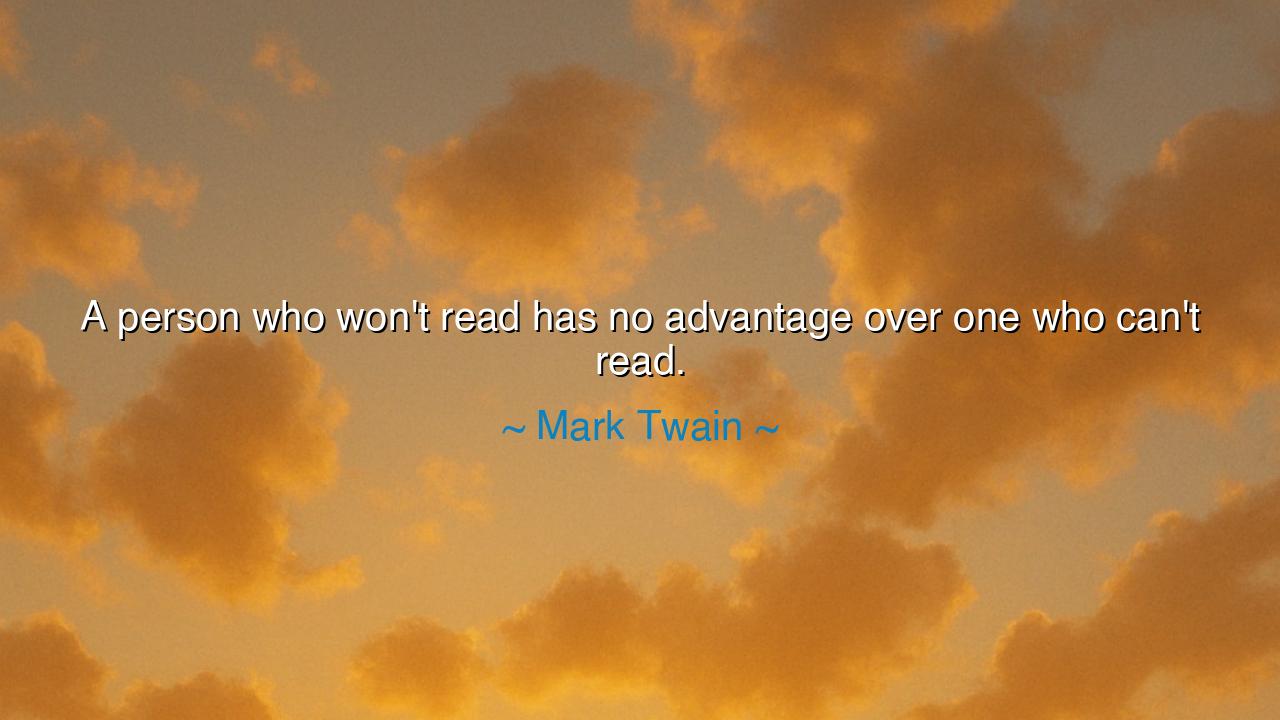
A person who won't read has no advantage over one who can't read.






There is both simplicity and depth in the words of Mark Twain, who declared: “A person who won’t read has no advantage over one who can’t read.” This statement, seemingly light and humorous, conceals a moral truth that cuts deep into the heart of human potential. In it, Twain warns of the tragedy not of ignorance, but of chosen ignorance — the waste of a mind capable of growth, yet content to remain still. To be able to read but refuse to do so, he tells us, is to live in the same darkness as one who never learned.
In the time of Mark Twain, the nineteenth century was an age of invention, revolution, and discovery — the dawn of the modern mind. The printing press had long since scattered knowledge across the world, and education was spreading among the common people. Yet even in that age of enlightenment, Twain saw a dangerous indifference. The problem was no longer that men could not read, but that they would not. The shackles had been removed, yet many refused to walk free. His words are a mirror to every generation since, for even in our own, with books, screens, and libraries overflowing with wisdom, how many choose silence over understanding?
To read, in Twain’s sense, is not merely to pronounce words, but to awaken the mind — to wrestle with ideas, to question, to dream. It is an act of liberation. Reading lifts us from the narrow walls of our own experience and gives us the eyes of a thousand souls. But when one refuses this gift, he remains as blind as the illiterate, though his eyes see and his lips can move. Twain’s phrase thus becomes a judgment against complacency: that the neglect of knowledge is a greater sin than its absence.
History offers many lessons on this truth. In ages past, slaves were forbidden to read, for their masters knew that literacy is power. Frederick Douglass, born into bondage, taught himself to read in secret. Each word he learned was a spark of freedom. He later wrote, “Once you learn to read, you will be forever free.” Twain’s quote speaks directly to this: if one who is able to read refuses to, he abandons the very power that Douglass risked his life to gain. To waste such ability is to betray both the gift and the generations who fought for it.
There is a quiet tragedy in the modern world — that books, once treasures, now gather dust. People scroll endlessly through fragments of noise but seldom drink deeply from the well of wisdom. Yet, as Twain’s insight reminds us, knowledge cannot nourish the closed mind. The person who “won’t read” builds his own prison out of comfort and distraction. He is like a farmer with a field rich in soil, yet he never plants, wondering why he starves while others reap. The ignorance that comes by neglect is not less deadly than the ignorance that comes by deprivation.
True education, therefore, is not given by schools or measured by degrees. It is a fire kindled within, sustained by curiosity and discipline. The educated soul is one who hungers for understanding, who reads not for vanity, but for transformation. To read is to converse with the dead, to commune with the living, to step into the boundless theater of human thought. The one who chooses not to read chooses silence over dialogue, darkness over light.
Let this then be the lesson: guard against the comfort of the unchallenged mind. Read not only for pleasure, but for awakening. Seek the wisdom that humbles and refines you. Read history, that you may gain perspective; read philosophy, that you may learn to think; read poetry, that your heart may stay alive. For every page turned is a step away from ignorance, and every idea understood is a seed of freedom.
Thus, as Mark Twain reminds us, the greatest tragedy is not illiteracy, but unlived potential. The person who “won’t read” has chained himself with invisible bonds — the bonds of indifference. But the one who reads, even a little, walks with kings, saints, and poets, and finds that the world is larger, kinder, and more wondrous than he ever dreamed.






AAdministratorAdministrator
Welcome, honored guests. Please leave a comment, we will respond soon